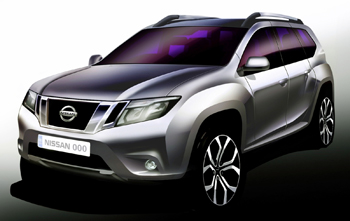 New Delhi, Oct 10: Nissan Motor Co. 7201.TO +2.57% Wednesday introduced its first compact sport-utility vehicle in India to tap demand for such products and challenge existing players like Ford Motor Co. F +0.73% , Renault S.A. RNO.FR +3.70% and Mahindra & Mahindra Ltd. 500520.BY +1.05%
New Delhi, Oct 10: Nissan Motor Co. 7201.TO +2.57% Wednesday introduced its first compact sport-utility vehicle in India to tap demand for such products and challenge existing players like Ford Motor Co. F +0.73% , Renault S.A. RNO.FR +3.70% and Mahindra & Mahindra Ltd. 500520.BY +1.05%
The Japanese auto maker said it has received about 6,000 customer orders for the Terrano since the vehicle was unveiled in late August. The Terrano is based on the Duster SUV of Renault, with which Nissan has a global alliance. It is produced at a joint plant of Renault and Nissan on the outskirts of Chennai city.
The Duster—which is also made at the same plant—is the most-successful vehicle for Renault in India with sales of more than 60,000 units since its introduction in July last year.
The Terrano is offered in seven versions with the option of either a 1.6-liter gasoline or a 1.5-liter diesel engine. The diesel engine is further offered in two options of 85 horsepower and 104 horsepower.
Prices start at 959,999 rupees ($15,500) at dealers in New Delhi, extending to about 1.24 million rupees for the top-end version.
The Duster starts at 7,99,000 rupees.
"Terrano is an important product for us and will set the pace for future product launches slated for 2014," said Kenichiro Yomura, president of Nissan's India unit. He didn't say which are the other vehicles that Nissan plans to introduce in India.
SUV sales in India grew 52% in the fiscal year ended March 31, compared with a 6.7% decline in the sales of cars.
But, demand has waned since companies raised prices from earlier this year to pass on a three-percentage-point increase in factory tax on locally assembled SUVs to 30%. Rising prices of diesel—the fuel used to run most SUVs in India—also affected demand. Sales of SUVs during the April-to-September period this year fell 4.8%.
The Terrano would compete with models such as Ford's recently introduced EcoSport, Tata Motors Ltd. 500570.BY +1.77% 's Safari Storme, Mahindra & Mahindra Ltd.'s XUV500 and Scorpio and the Duster.
Nissan expects that the Terrano would help revive its India sales that fell 43% during April-September 2013 to 12,343 vehicles. The introduction of the SUV comes during the festival season in India when the country's majority Hindus consider it auspicious to make new purchases.
The Terrano is the fourth vehicle that Nissan produces in India—it currently manufactures the Micra subcompact hatchback, the Sunny compact car and the Evalia van.
Nissan also assembles the Teana premium sedan from imported parts at the same factory. It also imports the X-Trail SUV and the 370Z sports car in India.
The company plans to start selling the Datsun Go from early 2014. It is the first model in a line of low-cost vehicles developed for emerging markets such as India under its revived Datsun brand.





Comments
Add new comment